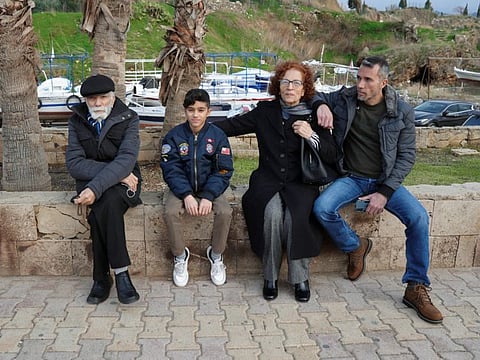Lebanon’s politicians eye expat vote ahead of March elections
Upcoming chamber of deputies will decide who Lebanon’s next president will be

Damascus: Lebanese politicians are scrambling to win the hearts of Lebanese expatriates, ahead of the country’s upcoming parliamentary elections, scheduled for March 2022.
When Prime Minister Najib Mikati fixed March 27 as the date for nationwide elections, most political parties welcomed the move, especially in the Christian community. The upcoming chamber of deputies will be the one to decide who Lebanon’s next president will be when the term of incumbent President Michel Aoun ends in October.
Presidential hopefuls aim at increasing their parliamentary representation in the upcoming chamber in order to secure enough votes for Lebanon’s top job next Autumn.
According to norm and a 1943 ‘gentleman’s agreement’ called the National Pact, the Lebanese Presidency is reserved exclusively for the country’s Maronite Christians.
Although no figure has yet officially submitted a nomination, it is an open secret that two men will be competing for the post: Suleiman Frangieh of the Marada Movement and Gibran Bassil of the Free Patriotic Movement (FPM).
Bassil, a former foreign minister, is also the son-in-law of the Lebanese President. After succeeding him as leader of the FPM, he hopes to succeed him at Baabda Palace as well.
He realises, however, that many Lebanese left the country during the era of his father-in-law, objecting to economic crisis that has held people by the throat since October 2019.
Thousands also left the country, voting with their feet, after the Beirut port explosion of August 2020, which killed over 220 people and tore down half the city.
Expatriate voters
For that reason, he had tried to prevent expatriates from voting, but that was considered unconstitutional, and, subsequently, aborted. There are 3.9 million registered voters in Lebanon, 225,000 of whom live in the Diaspora; 74,000 of those expatriates are Maronite Christians, while 45,000 are Sunni Muslims, 44,000 are Shiites, 22,000 are Greek Orthodox Christians, while Catholics and Druze combined account for 15,000 of the expatriate vote.
Bassil desperately needs the vote of the 74,000 Maronites but has been unsuccessful at reaching out to them, due to sanctions imposed on him by the United States back in November 2019, due to his alliance with Hezbollah.
According to Lebanese expats living in the US who spoke to Gulf News, they have been getting phone calls from the Free Patriotic Movement offices in Beirut, lobbying on behalf of Bassil.
One respondent said: “I hung up the phone. I am a dual citizen of Lebanon and the United States of America. The last thing I want is to be associated with somebody on the sanctions list of the US Department of Treasury.”
Bassil cannot travel to the US to attend rallies or approach potential voters but other Christians politicians can and have been engaged in aggressive lobbying ahead of the March elections.
Pierre Abu Assi of the Lebanese Forces (LF) visited Canada in December to drum up support among the Lebanese and Sami Gemayel of the Lebanese Phalange travelled to the US in October while Tony Frangieh of the Marada Movement is expected soon in Australia, lobbying for his father Suleiman, who will be challenging Bassil for the presidency in October.
Both the Marada Movement and the FPM parties are technically allied under the umbrella of the Hezbollah-led March 8 Coalition. Frangieh is the scion of a leading Maronite political family whose grandfather and namesake, Suleiman, had been president of Lebanon at the outbreak of the country’s civil war back in 1975.
In the outgoing chamber, the Marada Movement holds a tiny bloc of 3 MPs, while Bassil’s FPM controls the lion’s share of 29 MPs. Both are represented in the Mikati cabinet, based on their parliamentary shares with the FPM holding 6 out of 33 seats while the Marada Movement controls one seat only (after their protégé George Qurdahi resigned from the Ministry of Information in December, in light of a diplomatic crisis that he created with Saudi Arabia and the GCC in general).
The Christian Vote
The upcoming parliamentary vote will be mainly about who wins the majority of Christian seats in Lebanon’s 128-seat Chamber. Electing a president requires a 65-vote majority, which currently none of the Christian parties command, not even the FPM.
In the Lebanese north, joint lists are being discussed at present between the Lebanese Phalange of the Gemayel family and Christian activists from the October 17 Revolution, who staged demonstrations against the Aoun era back in 2019. Of the 225,000 registered expatriate voters, 30,000 are Maronites from the Lebanese North, and they won’t be voting for the FPM.
The battle will be for representation in the Christian towns of Batroun, Zhorta, and Bishirri (powerbase of Bassil, Frangieh, and Samir Geagea of the Lebanese Forces, respectively).
Batroun has two seats in the Lebanese Parliament, one traditionally for the FPM and one for the LP. If Bassil loses his seat in Batroun, then his main stronghold in Mount Lebanon will fall to his opponents. He also cannot penetrate Bishirri, which is pro-Gagegea, and nor can he win any representation in Zhorta, where Tony Frangieh is creating a joint Christian list with the Phalange to challenge the FPM in his family’s fiefdom.
Sign up for the Daily Briefing
Get the latest news and updates straight to your inbox



